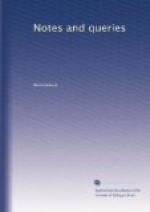“Monitos volumus Emptores, hosce Libros ea vendi conditione, ut cum eorum traditione pretium praesenti pecunia persolvatur. Et si quis Libros a se emptos intra sex septimanarum spatium, a prima Auctionis die numerandum, a Bibliopola non exegerit, eos cum emptoris prioris damno aliis vendere integrum erit ac licitum.
“Monentur etiam et rogantur,
ut ante meridiem ad horae octavae,
post meridiem vero ad secundae
punctum praesentes sese sistere
dignentur.”
Can any of your readers give me particulars about this John Maire?
W.J.
Havre.
* * * * *
REPLIES.
SHAKSPEARE’S USE OF THE WORD “DELIGHTED.”
(Vol. ii., pp. 113. 139.)
Although Mr. Hickson’s notion of the meaning of delight, in the three passages of Shakspeare he has cited, is somewhat startling, it was not to be summarily rejected without due examination; and yet, from a tolerably extensive acquaintance with old English phraseology, I fear I cannot flatter him with the expectation of having it confirmed by instances from other writers.
I believe that lighted is rather an unusual form to express lightened, disencumbered, but that it was sometimes used is apparent; for in Hutton’s Dictionary, 1583, we have “Allevo, to make light, to light.”—“Allevatus, lifted up, lighted.” And in the Cambridge Dictionary, 1594, “Allevatus, lifted up, lighted, raised, eased or recovered.” The use of the prefix de in the common instance of depart for to part, divide, is noticed by Mr. Hickson; and demerits was used for merits by many of our old writers as well as Shakspeare. I find decompound for compound in Heylyn’s Microcosmos, 1627, p. 249., thus:—“The English language is a decompound of Dutch, French, and Latin.”
These instances may serve to show that it is not at all improbable Shakspeare may have used delighted for lighted==lightened==freed from incumbrance; and it must be confessed that the sense and spirit of the passage in Measure for Measure would be much improved by taking this view of it.
On the other hand, it certainly does appear that the poet uses the termination _-ed_ for _-ing_, in the passages cited by Mr. Halliwell, where we have profess_ed_ for profess_ing_, becom_ed_ for becom_ing_, guil_ed_ for guil_ing_, brood_ed_ for brood_ing_, and deform_ed_ for deform_ing_: it was not unreasonable, therefore, to conclude that he had done so in these other instances, and that delight_ed_ stood for delight_ing_, and not for delight_ful_, as Mr. Halliwell implies. How far the grammatical usages of the poet’s time may have authorised this has not yet been shown; but it appears also that the converse is the case, and that he has used the termination _-ing_ for _-ed_; e.g. long_ing_ for long_ed_, all-obey_ing_ for all-obey_ed_, discontent_ing_ for discontent_ed_, multiply_ing_ for multipli_ed_, unrecall_ing_, for unrecall_ed_. Dr. Crombie (Etymology and Syntax of the English language, p. 150.) says:




